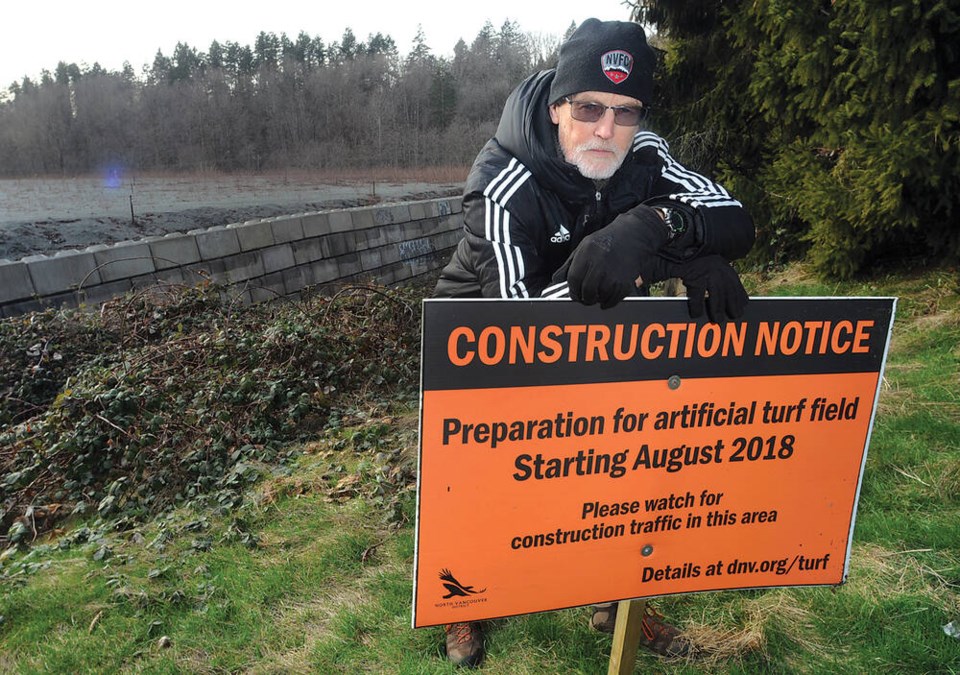District of North Vancouver council is adding artificial turf fields and the Spirit Trial to Deep Cove back into the 2023 budget and pushing the proposed municipal tax increase to 5.25 per cent.
Following strong criticism from the public on the District of North Vancouver’s proposed 2023 budget, staff have put forward a new “Plan B” budget that incorporates previously omitted projects. Projects now deemed as having a “relatively high probability of success,” from staff include the completion of up to six artificial turf sports fields at Handsworth Secondary, Inter River Park and the construction of the Spirit Trail connection between Maplewood and Deep Cove.
At a public input meeting last week, council spent hours getting an earful from the local soccer and cycling communities, expressing their dismay of long-promised projects being left out of the budget for another year.
“Public input has been higher than usual,” Rick Danyluk, deputy chief financial officer, told council Monday. “After receiving new provincial funding through the Growing Communities Fund and listening to the public, staff are recommending additional fields, and the Spirit Trail to Deep Cove, be included in the budget.”
Danyluk said funding for the projects, estimated to cost an additional $40 million combined, will be both borrowed and taken from the $10.25 million Growing Communities Fund grant announced for the district on March 3. Property taxes will also need to increase, he said, with staff proposing a rise of 5.25 per cent.
Previously, council was debating a tax increase of 4.5 per cent, which didn’t include new fields for Handsworth or Inter River or further work on the Spirit Trail. Under the current budget, the 5.25 per cent increase would result in a municipal tax bill about $131 higher than last year’s for a home assessed at the district average.
While all council members agreed the inclusion was necessary, some voiced their concerns the new additions would take away from other, equally important projects.
“I’m glad to see this new budget has funding allocated for the priorities of the community, namely active transport, like bike lanes in the Spirit Trail, and I’m pleased to see the funding for the artificial turf – all of these were dropped and chopped from the earlier draft budget,” said Coun. Catherine Pope. “But here’s the problem: All the other separated bike lanes are all being deferred, or are in the design stage. And yes, we want the Spirit Trail, but not at the expense of these other important bike infrastructure projects that link communities, get people out of their cars, reduce congestion and create a healthier, happier community.”
Agreeing with Pope’s comments, Coun. Jordan Back said that while revised budget was “definitely an improvement,” he would like to see it have a wider scope.
“There was a lot of focus on the Spirit Trail in the public input, which I think is great, but if it’s going to be at the expense of some other key connections, like the ones between town centres, I have a hard time supporting it,” he said.
He also cited the e-bike incentive he had pushed for in the previous term as a project that could do with having “a greater sense of urgency.”
Others touched on the hike to tax costs, including Coun. Jim Hanson, who said the tax may prove difficult for locals, despite him believing it to be “reasonable and responsible balancing,” he said.
“I believe that this plan responds to the specific community concerns that were brought up by the public input, and while it is true that the… district taxpayers can afford to pay more, it’s also true, in my belief, that property taxes can represent a significant burden to some members of the community,” he said. “We must be extremely careful to set tax rates that are reasonable and seek to avoid imposing undue burden on taxpayers.”
District of North Vancouver Mayor Mike Little said he thought staff had “responded well” to the concerns heard from the public.
“I will be supportive of the Plan B option, as much as I am a little nervous about the financial exposure of it and the deliverability of some of the projects, I have to acknowledge and recognize what we’ve heard in the community,” he said.
Mina Kerr-Lazenby is the North Shore News’ Indigenous and civic affairs reporter. This reporting beat is made possible by the Local Journalism Initiative.



